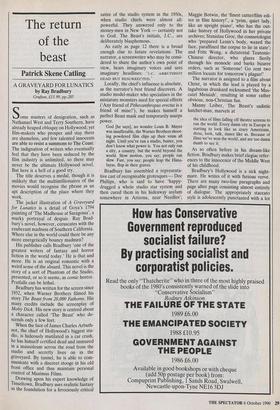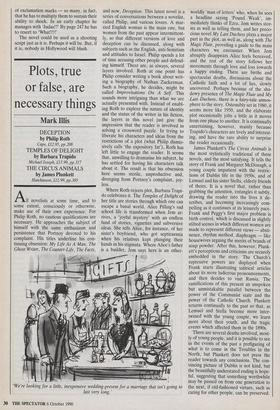The return of the beast
Patrick Skene Catling
A GRAVEYARD FOR LUNATICS by Ray Bradbury
Grafton, £13.99, pp.285
Some masters of denigration, such as Nathanael West and Terry Southern, have already heaped obloquy on Hollywood; yet film-makers who prosper and stay there are shameless, and few talented innocents are able to resist a summons to The Coast. The indignation of writers who eventually feel that they have been seduced by the film industry is unlimited, so there may never be the ultimate Hollywood novel. But here is a hell of a good try. The title deserves a medal, though it is unlikely that the multimillionaires of the movies would recognise the phrase as an apt description of the place where they work.
The jacket illustration of A Graveyard for Lunatics is a detail of Goya's 1794 painting of 'The Madhouse at Saragossa', a murky portrayal of despair. Ray Brad- bury's novel, however, coruscates with the exuberant madness of Southern California. Where else in the world could there be any more energetically bouncy madmen? His publisher calls Bradbury 'one of the greatest writers of fantasy and horror fiction in the world today.' He is that and more. He is an original romantic with a weird sense of the absurd. This novel is the story of a sort of Phantom of the Studio, presented, or so it seems, as comic horror. Pratfalls can be lethal.
Bradbury has written for the screen since 1952, when Warner Brothers filmed his story The Beast from 20,000 Fathoms. His many credits include the screenplay of Moby Dick. His new story is centred about a character called 'The Beast' who de- scends only a few feet.
When the face of James Charles Arbuth- not, the chief of Hollywood's biggest stu- dio, is hideously mutilated in a car crash, he has himself certified dead and immured in a mausoleum across the road from the studio and secretly lives on in the graveyard. By tunnel, he is able to com- municate with a discreet stooge in his old front office and thus maintain personal control of Maximus Films.
Drawing upon his expert knowledge of Tinseltown, Bradbury uses realistic fantasy as the foundation for a ferociously critical satire of the studio system in the 1950s, when studio chiefs were almost all- powerful. They answered only to the money-men in New York — certainly not to God. The Beast's initials, J.C., are deliberately blasphemous.
As early as page 12 there is a broad enough clue to future revelations. The narrator, a screenwriter who may be consi- dered to share the author's own point of view, hears imaginary voices and sees imaginary headlines: 'LC. ARBUTHNOT DEAD BUT RESURRECTED.'
Locally, the chief's influence is absolute, as the narrator's best friend discovers. A studio model-maker who specialises in the miniature monsters used for special effects ('Any friend of Pithecanthropus erectus is a friend of mine!'), he makes himself a perfect Beast mask and temporarily usurps power.
God [he says], no wonder Louis B. Mayer was insufferable, the Warner Brothers shoot- ing powdered film clips up their veins all night. Until you've run a studio, buster, you don't know what power is. You not only run a city, a country, but the world beyond the world. Slow motion, you say; people run slow. Fast, you say; people leap the Hima- layas, flop in their graves.
Bradbury has assembled a representa- tive cast of recognisable grotesques — Doc Phillips, who is said to have 'happy- drugged a whole studio star system and then cured them in his hideaway asylum somewhere in Arizona, near Needles'; Maggie Botwin, the 'finest cutter/film edi- tor in film history!', a 'prim, quiet lady, like an upright piano', who has the out- take history of Hollywood in her private archives; Stanislau Groc, the cosmetologist who 'prepared Lenin's body, waxed the face, paraffined the corpse to lie in state'; and Fritz Wong, a dictatorial Teutonic- Chinese director, who glares fierily through his monocle and barks bizarre orders, such as 'Someone! Go rent two million locusts for tomorrow's plague!' The narrator is assigned to a film about Christ, in which the lead is played by a lugubrious drunkard nicknamed 'the Mus- catel Messiah', resulting in some rather obvious, non-Christian fun.
Manny Leiber, The Beast's sadistic hatchet-man, marvels at
the idea of films falling off theatre screens to run the world. Every damn city in Europe is starting to look like us crazy Americans, dress, look, talk, dance like us. Because of films we've won the world, and are too damn dumb to see it.
As so often before in his dream-like fiction, Bradbury makes brief elegiac refer- ences to the innocence of the Middle West of his childhood.
Bradbury's Hollywood is a sick night- mare. He writes of it with furious verve. There are many two-line paragraphs and page after page consisting almost entirely of dialogue. The appropriately staccato style is adolescently punctuated with a lot of exclamation marks — so many, in fact, that he has to multiply them to sustain their ability to shock. In an early chapter he manages with `Judas!?' By page 247 he has to resort to What!!!!'
The novel could be used as a shooting script just as it is. Perhaps it will be. But, if it is, nobody in Hollywood will blush.



















































 Previous page
Previous page